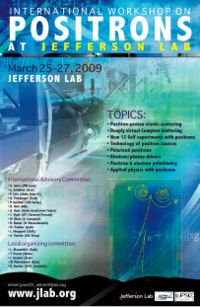Difference between revisions of "JPOS09"
| Line 13: | Line 13: | ||
looking for positron currents of 1 <math>\mu</math> A in Hall C or 100 nA in Hall B. | looking for positron currents of 1 <math>\mu</math> A in Hall C or 100 nA in Hall B. | ||
| + | =Positron production= | ||
| + | |||
| + | At > 50 GeV incident electron energies, an undulator can be used to generate MeV energy photons which pair produce in a target. You get about 200 photons for each incident electron? | ||
| + | |||
| + | At between 1 and 50 GeV, back scattered compton photons may be the optimal choice for producing positrons. | ||
| + | |||
| + | The conventional method of using a converter target my be the best choice for incident electron energies less than 1 GeV. | ||
| + | |||
| + | The undulator and compton techniques create polarized photons and then polarized positrons. For the conventional method you could use off axis bremmstrahlung to create linear photons or polarize the incident electrons and have the polarization transfer. | ||
=Polarimetry= | =Polarimetry= | ||
Revision as of 21:12, 26 March 2009
http://conferences.jlab.org/JPOS09/
Positron_Workshop_2009 : March 25-27, 2009
By September 2009:
Wed 3/25/09
2 exchange
looking for positron currents of 1 A in Hall C or 100 nA in Hall B.
Positron production
At > 50 GeV incident electron energies, an undulator can be used to generate MeV energy photons which pair produce in a target. You get about 200 photons for each incident electron?
At between 1 and 50 GeV, back scattered compton photons may be the optimal choice for producing positrons.
The conventional method of using a converter target my be the best choice for incident electron energies less than 1 GeV.
The undulator and compton techniques create polarized photons and then polarized positrons. For the conventional method you could use off axis bremmstrahlung to create linear photons or polarize the incident electrons and have the polarization transfer.
Polarimetry
P. Schuller (DESY) has the iron block used in E-166 at SLAC for the compton transmission polarimeter. The incident photon Energy went up to 8 MeV.
We could measure positron polarization by measuring the polarization of photons from the positron annihilation. Compton scattering depends on the polarization of the struck atomic electrons. An external B-field will polarize the FE block. You can either flip the direction of the B-file or the direction of the incident photon polarization to measure the photon polarization.
The IAC could make a compton transmission polarimeter to use on the photo-fission experiment as well as a proto-type for JLab.
Thermal positrons
How big is the user thermal positron user community?
